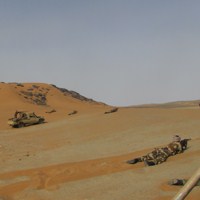Since Mali’s current crisis began in 2012, West Africa’s terrorist movements have generated sustained and intense international concern. On June 3, the U.S. State Department’s Rewards for Justice Program announced its “first reward offers for terrorists in West Africa.” Bounties ranged from $3 million to $5 million for commanders in al-Qaida in the Islamic Maghreb (AQIM) and the Movement for Unity and Jihad in West Africa (MUJWA), and $7 million for Abubakar Shekau, the formal leader of the Nigerian Muslim sect Boko Haram. Rewards for Justice, its website explains, exists to incentivize the release of information that helps prevent “international terrorist acts” or punish their perpetrators.
The men named are undoubtedly dangerous—but are they international threats? The State Department has moved cautiously on issues of terrorism in West Africa, for example by designating several individuals in Boko Haram as international terrorists but refraining, for the time being, from so designating the entire movement. Yet from other quarters, there is a danger of unfounded alarmism regarding radicalization in West Africa and the globalization of its violent movements. The media has frequently peddled the image of an “arc of instability” stretching across the Sahel, or even more simplistic images of a Muslim Africa at war with a Christian Africa. In this atmosphere, groups like AQIM, MUJWA and Boko Haram merit serious attention, but real questions remain concerning their capacities, ranges and limitations.
For one thing, as Western policymakers construct and reconstruct “maps” of global terrorism, it is worth asking to what extent metaphors originating from the experience of Afghanistan apply to West Africa. For the past decade and more, security analysts have frequently argued that the attacks of Sept. 11, 2001, resulted from international terrorists’ ability to train for and plan operations in an “ungoverned space,” namely Afghanistan. Other ungoverned spaces, the argument often continues, offer “safe havens” to terrorists and therefore threaten the security of the United States. Since at least 2004, analysts have argued that parts of West Africa, particularly Nigeria and the western Sahel region, constitute the same kind of dangerous, ungoverned spaces—“breeding grounds,” as an oft-used metaphor puts it, for extremism. The violence caused by Boko Haram in northern Nigeria beginning in 2003, and more systematically since 2010, along with the seizure of power in northern Mali by AQIM, MUJWA and the Ansar al-Din movement in 2012, could be taken as confirmation of grim predictions from the early 2000s concerning West Africa’s vulnerability to global terrorist predations.

